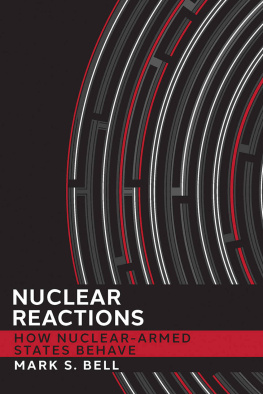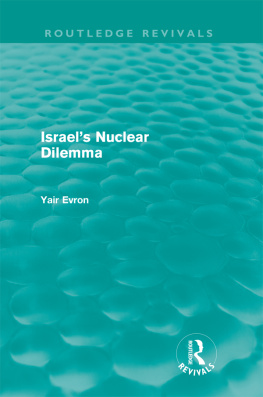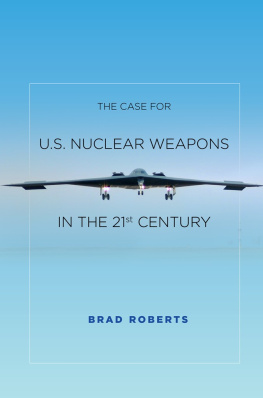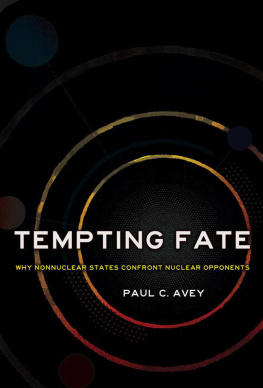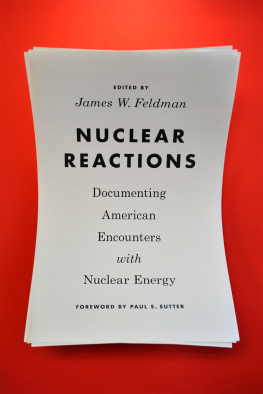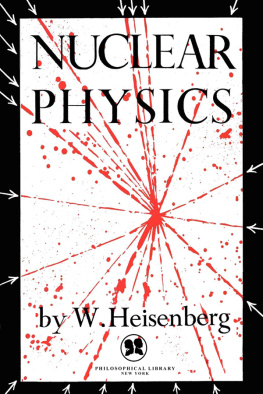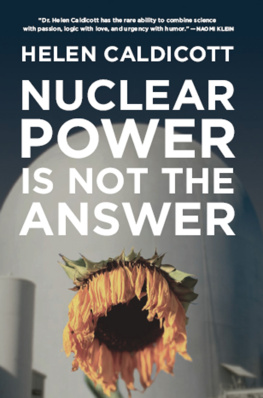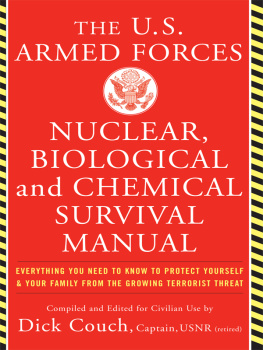Marc S. Bell - Nuclear reactions : how nuclear-armed states behave
Here you can read online Marc S. Bell - Nuclear reactions : how nuclear-armed states behave full text of the book (entire story) in english for free. Download pdf and epub, get meaning, cover and reviews about this ebook. year: 2021, genre: Politics. Description of the work, (preface) as well as reviews are available. Best literature library LitArk.com created for fans of good reading and offers a wide selection of genres:
Romance novel
Science fiction
Adventure
Detective
Science
History
Home and family
Prose
Art
Politics
Computer
Non-fiction
Religion
Business
Children
Humor
Choose a favorite category and find really read worthwhile books. Enjoy immersion in the world of imagination, feel the emotions of the characters or learn something new for yourself, make an fascinating discovery.
- Book:Nuclear reactions : how nuclear-armed states behave
- Author:
- Genre:
- Year:2021
- Rating:4 / 5
- Favourites:Add to favourites
- Your mark:
- 80
- 1
- 2
- 3
- 4
- 5
Nuclear reactions : how nuclear-armed states behave: summary, description and annotation
We offer to read an annotation, description, summary or preface (depends on what the author of the book "Nuclear reactions : how nuclear-armed states behave" wrote himself). If you haven't found the necessary information about the book — write in the comments, we will try to find it.
Nuclear reactions : how nuclear-armed states behave — read online for free the complete book (whole text) full work
Below is the text of the book, divided by pages. System saving the place of the last page read, allows you to conveniently read the book "Nuclear reactions : how nuclear-armed states behave" online for free, without having to search again every time where you left off. Put a bookmark, and you can go to the page where you finished reading at any time.
Font size:
Interval:
Bookmark:
Nuclear Reactions
How Nuclear-Armed States Behave
MARK S. BELL
Cornell University Press
Ithaca and London
For Rowan
Table
.South African military operations in Angola before and after nuclear acquisition
Figures
.The theory of nuclear opportunism
.The theory of nuclear opportunism and empirical predictions
.Predictions for states facing serious territorial threats or engaged in war
.Predictions for states not facing serious threats but with senior allies
.Predictions for rising states not facing serious threats
.Predictions for declining states not facing serious threats
.The theory of nuclear opportunism applied to Britain, 1955
.MIDs involving Britain over time
.Southern Africa
.The theory of nuclear opportunism applied to South Africa, 1979
.The theory of nuclear opportunism applied to the United States, wartime
.The theory of nuclear opportunism applied to the United States, postwar
This book would not have been started, let alone finished, without a great many people.
While I was an undergraduate at Oxford, Nigel Bowles and Paul Martin encouraged my interest in the academic study of politics. I would not have considered pursuing graduate studies in political science (let alone actually done so) without their influence or advice. At Harvard Kennedy School, where I spent two years getting a masters in public policy while also coming to the conclusion that I wanted a career in academia rather than in policy, Matt Bunn inspired the interest in nuclear issues that motivated me to pursue a PhD and that sustained this entire project.
At MIT, I could not have asked for better advisers. Barry Posen engaged with every nut and bolt of the argument in this book and offered line-by-line comments on multiple iterations of the work. The quality and impact of his scholarship is a model that I will only ever aspire to meet; his demand that scholars tackle important questions is one I will continue to seek to live up to. Vipin Narangs mentorship and advice were critical, and he continues to be a first port of call for advice on negotiating academia. Taylor Fravels suggestions substantially increased the clarity of the argument and writing throughout, and his questions and comments have consistently cut to core theoretical and empirical issues. Last but not least, the intellectual influence of Frank Gavin runs throughout this book. His commitment to bringing historians and political scientists together has had a profound influence on my own work. Collectively, these individuals provided a level of expertise on nuclear issues that would have been impossible to assemble at almost any other institution, but the personal support and advice they provided at every turn have perhaps been even more valuable.
Similarly, the tight-knit community of graduate students and the predoctoral and postdoctoral fellows at MIT provided intellectual stimulation, encouragement, and friendship. Among many others, Dan Altman, Noel Anderson, Paul Avey, Chris Clary, James Conran, Fiona Cunningham, Gene Gerzhoy, Brendan Rittenhouse Green, Brian Haggerty, Peter Krause, Julia Macdonald, Tim McDonnell, Nicholas Miller, Rohan Mukherjee, Reid Pauly, Josh Shifrinson, Peter Swartz, Joseph Torigian, Rachel Whitlark, Alec Worsnop, and Yiqing Xu deserve particular thanks.
Many other scholars generously gave their time, advice, and comments at various stages in the process. They include William Boettscher, Hal Brands, Mlfrid Braut-Hegghammer, Matthew Bunn, James Cameron, Andrew Coe, Alex Downes, Peter Feaver, Matthew Fuhrmann, Charlie Glaser, Ryan Grauer, Kelly Greenhill, David Holloway, Jacques Hymans, Peter Katzenstein, Peter Krause, Matthew Kroenig, Keir Lieber, Sean Lynn-Jones, Marty Malin, Rupal Mehta, Alex Montgomery, Steve Miller, Rich Nielsen, Benot Pelopidas, Evan Perkoski, Mike Poznansky, Brad Roberts, Sebastian Rosato, Joshua Rovner, Scott Sagan, Rob Schub, Todd Sechser, Keith Shimko, Etel Solingen, Caitlin Talmadge, Nina Tannenwald, Monica Toft, Stephen Van Evera, Anna-Mart Van Wyk, Jane Vaynman, Stephen Walt, Nicholas Wheeler, and Cat Worsnop.
This book was completed at the University of Minnesota, which has proved to be a wonderfully supportive intellectual home. I have benefited hugely from the insights, advice, friendship, and support of many colleagues, including Cosette Creamer, Bud Duvall, Paul Goren, James Hollyer, Tanisha Fazal, John Freeman, Helen Kinsella, Ron Krebs, Howie Lavine, Dan Myers, Rob Nichols, Kathryn Pearson, Michelle Phelps, David Samuels, Jane Sumner, and Josef Woldense. The Political Science Department provided the resources that enabled me to host a book workshop in November 2017, at which Hal Brands, Scott Sagan, Etel Solingen, and Nina Tannenwald, along with Bud, Ron, and Nisha, both took the book apart and provided a path forward to put it back together. Jen Spindel took notes throughout, and her forty-page summary of all the suggestions made was enormously helpful as I reconstructed and redrafted the manuscript. Thanks are also due to two undergraduate students, Cheyenne Tretter, who provided exceptional research and editorial assistance at several different stages, and Josh Mohling, who copyedited the entire manuscript.
In addition to the MIT Political Science Department and Security Studies Program, and the University of Minnesotas Political Science Department and College of Liberal Arts, generous financial support for this project was provided by the Harvard Belfer Centers International Security Program and Project on Managing the Atom, the Smith Richardson Foundation, and the Tobin Project. The staff at all these institutions, including, among others, Susan Twarog, Joli Divon Saraf, Casey Johnson, Diana Gallagher, Josh Anderson, Susan Lynch, Alexis Cuttance, Tia Phan, Kyle Edwards, and Sara Flannery, provided administrative support that was a model of efficiency and allowed me to focus on research.
At Cornell University Press, Roger Haydon has diligently and patiently handled my queries throughout the review and publication process, and I also thank the reviewers and editors of the Security Affairs series for their thoughtful and incisive comments on the manuscript. Amron Gravett compiled the index and Mike Bechthold produced the map in chapter 3. Portions of this book draw on previously published articles in International Security and Journal of Strategic Studies. I thank MIT Press and Taylor and Francis for the permission to reprint this content.
My deepest debts are those nearest to home. My family has been encouraging, inspiring, caring, and loving. My brother and sister have supported me even though I have been mostly absent and have seen them far less than I would want over the past few years. My parents have encouraged me unconditionally at every turn despite my being so far from home. They inspired my love of learning and intellectual curiosity about the world and are models of parenting. I am more grateful than they know for everything they have done for me, and I will keep trying to make them proud. It seems deeply inadequate that I can only offer them my gratitude.
Sarahs love, commitment, and support have been unyielding. I could not ask for a better partner. Her loyalty, compassion, and understanding have made me a better person. Our daughter Rowan arrived with impeccable timing the day after I submitted the manuscript to Cornell for review, and she has transformed and enriched our lives in more ways than I can describe. This book is dedicated to her.
AIOC | Anglo-Iranian Oil Company |
ANC |
Font size:
Interval:
Bookmark:
Similar books «Nuclear reactions : how nuclear-armed states behave»
Look at similar books to Nuclear reactions : how nuclear-armed states behave. We have selected literature similar in name and meaning in the hope of providing readers with more options to find new, interesting, not yet read works.
Discussion, reviews of the book Nuclear reactions : how nuclear-armed states behave and just readers' own opinions. Leave your comments, write what you think about the work, its meaning or the main characters. Specify what exactly you liked and what you didn't like, and why you think so.

